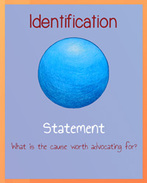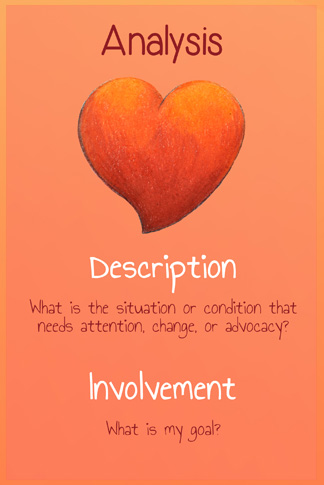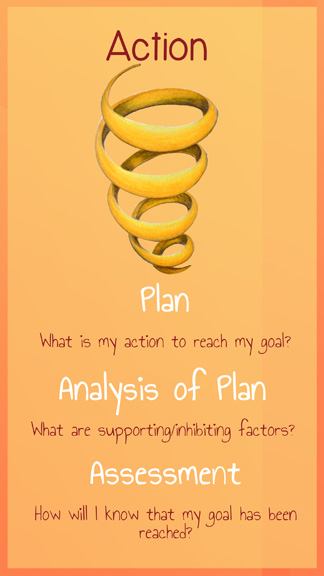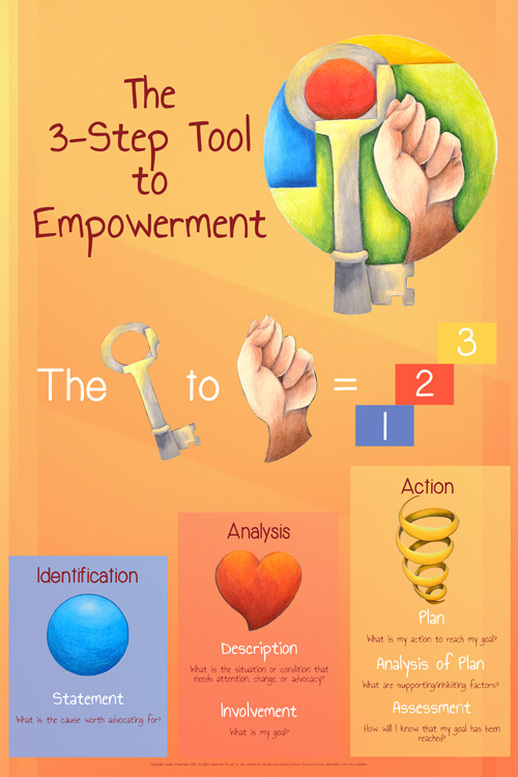"Children who received children's rights education started using their knowledge of rights as a values framework for critical analysis." (Covell, 2013)
Critical Thinkers Problem Solvers Innovators Self-Regulators Collaborators
This is how we stand together...
|
The 3-Step Tool to Empowerment is the advocacy tool used in Children's Rights Education. Used primarily in the exercise of the child's participation rights as outlined in Articles 12, 13, 14, and 15, this tool provides the child with a clear guide when acting as an agent of change.
The 3-Step-Tool expands the 3 principles of Children's Rights Education, which are: Knowledge of Rights, Values of Respect, and Responsible Behaviours. |
Enabling the Peacemakers of Tomorrow
A commitment to advance a free democratic society depends, first, on education securing non-discrimination principles where all children have the right to be included “irrespective of the child’s, or his or her parent’s or legal guardian’s race, colour, sex, language, religion, political or other opinion, national, ethnic or social origin, property, disability, birth or other status” (Article 2). Furthermore, the principle of indivisibility has to be respected so that children can identify the social injustices that threaten liberty, equality, and dignity. According to John Dewey, it is the human responsibility to advance society, and this requires defining the purpose of education to foster participation in a democratic society (Schecter, 2011). An education that includes all children without discrimination has to further advance the rights of children to include democratic participation to enable them to meaningfully solve social injustices that threaten democracy and global peace. Essentially, in a government of the people, if “citizens lack an equal say in salient matters of public significance, or equal standing before the laws” (Ober, 2012), then it is not a democracy. Projected onto education, denying children knowledge of their rights disempowers them. This, in essence, is pedagogy to oppress, where democracy is glorified while children are silenced (Friere, 2008). But, the democratic values of liberty, equality, and dignity have the potential to bring about global peace. Rather than silence our children through an autocratic system designed to satisfy a corporate, political and social agenda without any concern for individuals or the future, education has to empower children to participate democratically as they question social injustices in their pursuit of peace. The Convention stipulates the democratic participation rights of children. Accordingly, it is the child’s right to have the freedom to voice an opinion in all matters concerning him or her (Article 12). The child has the right to freedom of information (Article 13), and the right to “freedom of thought, conscience, and religion” (Article 14). Finally, the child has the right to associate freely and peacefully with others (Article 15). The fulfilment of these democratic participation rights for each child is the legal obligation of signatories to the Convention, and ensures the child the freedom to act responsibly as a free citizen to uphold all the rights outlined in the Convention. The principle of interdependence, where each right within the Convention contributes to the realization of a child’s dignity, requires that all these rights be respected for every child according to the proclamation in the 1945 Charter of the United Nations.
But, the ability to identify injustice is not purely connected to an inclination to take action (Ober, 2012). Education needs to equip children with the “critical literacy skills necessary for participatory democratic citizenship” (Hyslop-Margison & Pinto, 2007). Instead of succumbing to social injustices caused by neo-liberal capitalism, education should serve to develop critical literacy skills in children to “prepare them to become political agents of democratic change” (ibid). As education equips children with the tools to think beyond the restricted ideals of the neo-liberal global market (ibid), children are encouraged and supported to exercise their democratic rights to act as agents of change as they participate to actively challenge social injustice that threatens democracy. In doing so, they uphold the principles enshrined in the 1945 Charter of the United Nations by uniting together to “maintain international peace and security.”
But, the ability to identify injustice is not purely connected to an inclination to take action (Ober, 2012). Education needs to equip children with the “critical literacy skills necessary for participatory democratic citizenship” (Hyslop-Margison & Pinto, 2007). Instead of succumbing to social injustices caused by neo-liberal capitalism, education should serve to develop critical literacy skills in children to “prepare them to become political agents of democratic change” (ibid). As education equips children with the tools to think beyond the restricted ideals of the neo-liberal global market (ibid), children are encouraged and supported to exercise their democratic rights to act as agents of change as they participate to actively challenge social injustice that threatens democracy. In doing so, they uphold the principles enshrined in the 1945 Charter of the United Nations by uniting together to “maintain international peace and security.”




